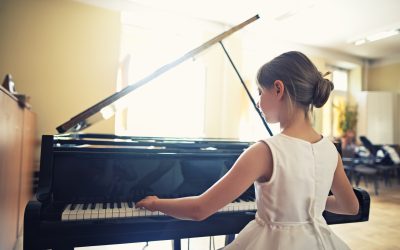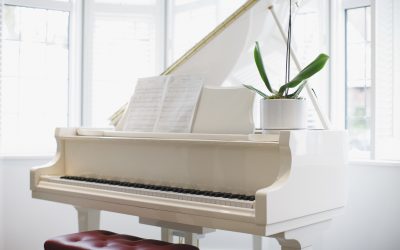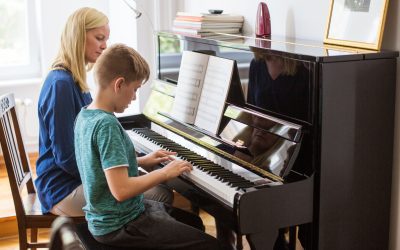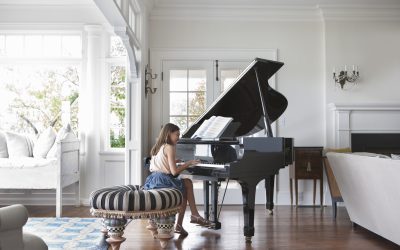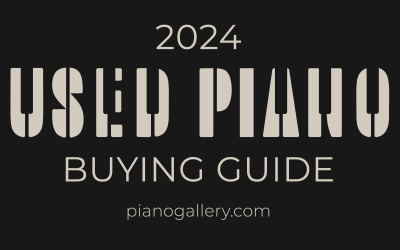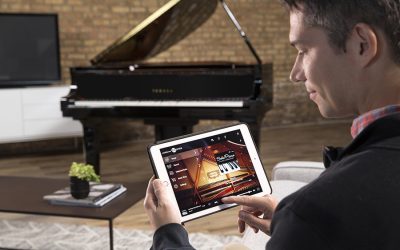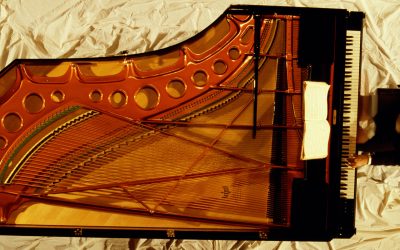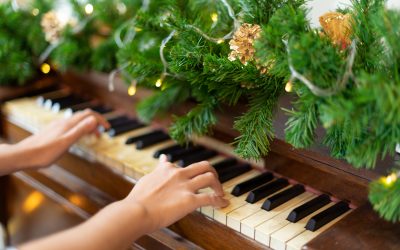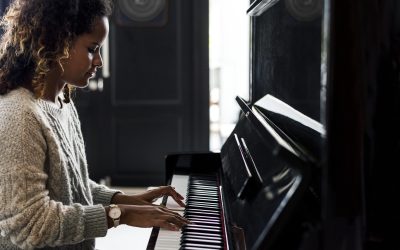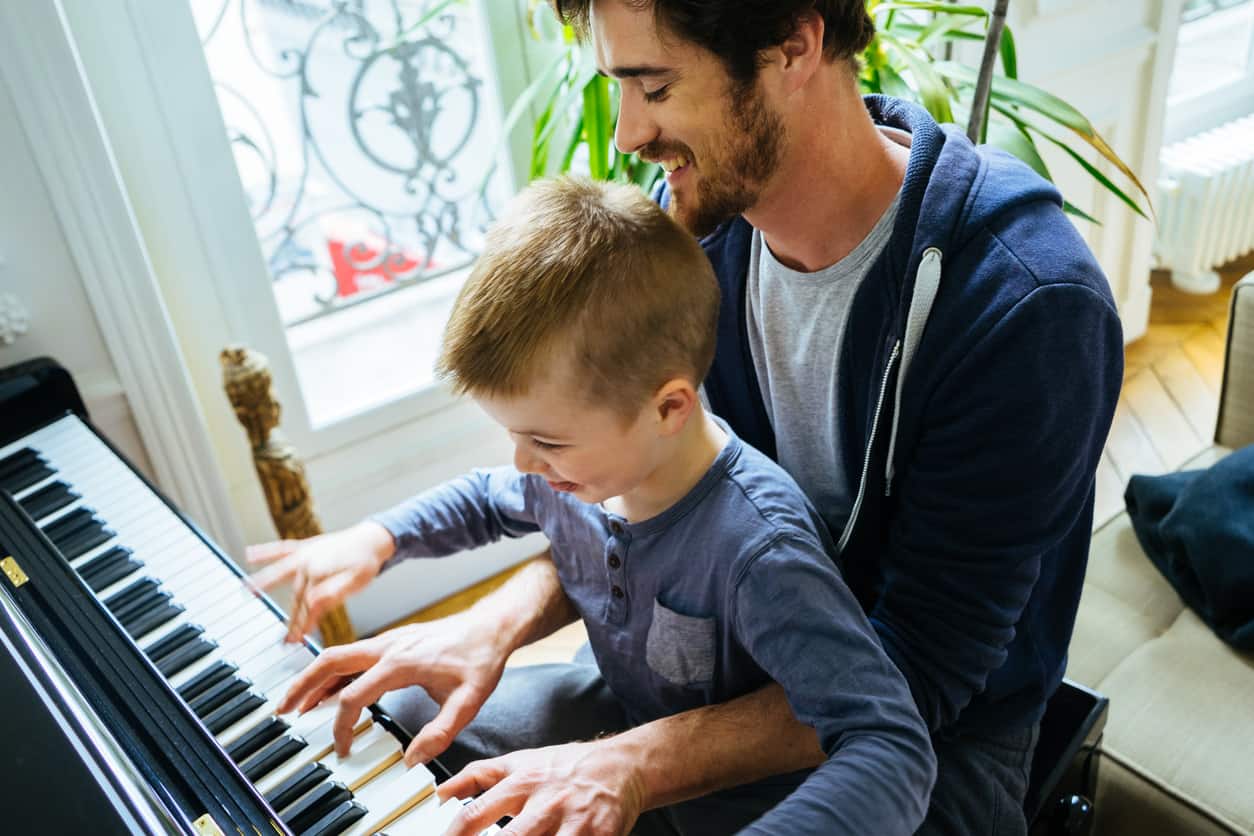
Baby Grand Piano Buying Guide
Baby grand pianos are a smaller version of a traditional grand piano. They are typically 5’ to 5′ 6” in length (from the tail to the keyboard). High-quality baby grand pianos, such as the popular Yamaha C1X hold their value extremely well, especially with care and regular maintenance.
Many clients consider a baby grand piano if they love the look of the grand piano but don’t have space for a full-sized grand. The soundboards of a baby grand piano also tend to be longer than traditional upright pianos, giving them a better sound quality than many vertical piano options.
This baby grand piano buying guide reviews some of the most commonly asked questions about baby grand pianos as well as what to consider when purchasing a baby grand piano.
Piano Guide Quick Links
What is a Baby Grand Piano?
How Does a Baby Grand Piano Differ from a Grand Piano?
What to Consider When Buying a Baby Grand Piano?
Does a Baby Grand Piano Have 88 Keys?
Most Popular Baby Grand Piano Models in the United States
Comparing Baby Grand and Upright Pianos
Where to Place a Baby Grand Piano in the Home
How Much Space Does a Baby Grand Piano Need?
What to Consider When Comparing a New & Used Baby Grand Piano
What is a Baby Grand Piano?
A baby grand piano is a smaller version of the grand piano, designed to fit into more compact spaces while still delivering the rich, full sound associated with grand pianos. Typically ranging from 4 feet 6 inches to 5 feet 6 inches in length, baby grand pianos are a popular choice for homes, small venues, and teaching studios. They offer a balance of aesthetics, sound quality, and space efficiency, making them an attractive option for many piano enthusiasts.
How Does a Baby Grand Piano Differ from a Grand Piano?
The primary difference between a baby grand piano and a grand piano is size. Grand pianos come in various sizes, generally classified into three categories: baby grand, medium grand, and concert grand. The concert grand is the largest, often exceeding 9 feet in length, while the baby grand is the smallest.
Choosing a grand piano over a baby grand piano often comes down to a desire for superior sound quality, increased dynamic range, and professional performance capabilities. Grand pianos, particularly larger models like concert grands, have longer strings and larger soundboards, which produce a richer, more resonant tone with greater depth and volume. This makes them ideal for concert halls, professional recording studios, and serious pianists who demand the highest level of acoustic excellence. The larger action mechanism of grand pianos also provides a more responsive touch, allowing for nuanced expression and greater control over dynamics and articulation. For these reasons, musicians seeking the utmost in performance quality and sound fidelity may opt for a grand piano.
On the other hand, someone may choose a baby grand piano over a larger grand piano for its practical advantages and still-impressive musical capabilities. Baby grand pianos are more space-efficient, fitting comfortably into smaller living spaces, homes, and intimate venues without sacrificing the elegance and tonal richness associated with grand pianos. They are also more affordable, making them accessible to a wider range of buyers who still want the grand piano experience but within a more manageable budget. Additionally, baby grand pianos are easier to maintain and move, making them a more practical choice for those who require flexibility. Their combination of quality, aesthetics, and space efficiency makes baby grand pianos an excellent choice for many pianists and music lovers.
- Size: Baby grand pianos are typically 4 feet 6 inches to 5 feet 6 inches long, whereas grand pianos can range from 5 feet 6 inches to over 9 feet.
- Sound Quality: Larger grand pianos have longer strings and larger soundboards, which generally produce a richer, more resonant sound compared to the baby grand.
- Price: Due to their smaller size, baby grand pianos are usually less expensive than their larger counterparts.
- Space Requirements: Baby grand pianos require less floor space, making them more suitable for homes and smaller rooms.
- Action: The touch and responsiveness of the keys can differ slightly due to the size and length of the action mechanism, but high-quality baby grands can still offer excellent performance.
What to Consider When Buying a Baby Grand Piano
Choosing a quality baby grand piano is about more than just esthetics. Considering things like tone, playability, and value can ensure your new piano lasts and is a purchase you are happy with for years to come.
1. Determine Your Piano Budget
The first thing to consider when shopping for a baby grand piano is your piano budget. Having a budget in mind allows you to go in to a piano store knowing what you’re able to spend on a new piano. It can also determine whether a new or used baby grand piano will be the best purchase for you. If you have a tight budget, you may be interested in our blog about how to afford a piano on a budget.
The cost of a new baby grand piano typically starts around $13,000, while a used baby grand piano can be as low as $4,000. The benefit of purchasing a piano, especially if it’s a high-quality brand such as Yamaha, Bösendorfer, Steinway, or Kawai, is that the piano will hold its value for a long time. If you purchase new, you can expect the piano to last 50-70 years in most cases. For used pianos, as long as they are well-maintained, you can typically get several years or even decades out of them before their components wear down.
2. Explore Different Sizes of Baby Grand Pianos
The rule of thumb with buying the best piano possible is to purchase a quality brand with the longest soundboard you can afford (and place in your home). For instance, a 5′ Yamaha GB1K Baby Grand will have a lesser sound than that of a Yamaha GC1 5’3″ Baby Grand, which has an additional 3″ of soundboard to produce a more resonant tone. Even within a single brand, you can find variations, such as comparing the 5’3″ Yamaha GC1 to the 5’3″ Yamaha C1X, the quality of which emulates the iconic CFX concert grand piano. With this in mind, you’ll often find better sound from a larger used baby grand piano of a quality brand than a brand new, smaller baby grand piano. After you determine your budget, it’s wise to play a range of baby grand pianos, used and new, to get a feel for the sound and resonance you enjoy best. More experienced piano players are more likely to be pickier about the piano sound than beginner piano players–if you’re not confident in your musical ear, it can help to bring along a friend or family member who has experience with pianos.
3. Consider Financing Options
Don’t take the sticker price at face-value when shopping for a new baby grand piano. There are usually financing deals or trade-in options that can save you some extra money. If you work with a reputable piano dealer, they’re likely to be upfront with these options, but it never hurts to ask. A little extra savings can help you get a higher-quality piano that you’ll likely be happier with for the longer term.
4. Play a Variety of Demo Songs
If you’re an experienced piano player, you probably already have a checklist of how you’d like your piano to play. For instance, if you’re an expressive player, the nuanced responsiveness of the piano keys will make a huge difference in whether you enjoy playing your new baby grand piano or are disappointed each time you sit down. If you like classical performance pieces, you may be looking for a piano with a brighter tone, or if you like more moody modern dramatic pieces, you may be looking for a sound that is deeper and more resonant. The best advice when shopping for a new piano is to play many pianos and to play a few different song styles to really get a feel for how the piano feels and sounds. If you’re still new to playing the piano (or are shy about playing in front of others), your piano salesperson will have a full repertoire of demo songs they will happily play for you.
5. Don’t Forget Maintenance
To maintain its value, regular maintenance like tuning, dusting, and polishing is a necessity for your baby grand piano. The national average for a piano tuning is relatively inexpensive, costing between $100-$200 and is recommended annually. Keeping the strings, hammers, and soundboard clear of dust and keeping keys clean and polished will help hold the performance ability of the piano components, thereby increasing the long-term value of the instrument.
Does a Baby Grand Piano Have 88 Keys?
Yes, a baby grand piano typically has 88 keys, which is the standard for most modern pianos. This includes 52 white keys and 36 black keys, covering seven octaves plus a minor third, from A0 to C8. The full range allows pianists to perform a wide repertoire of music.
Most Popular Baby Grand Piano Models in the United States
Some of the most popular baby grand pianos in the United States include:
U.S. buyers typically look for several key features when selecting a baby grand piano, including brand reputation, sound quality, touch response, and overall craftsmanship. Brands such as Steinway & Sons, Yamaha, and Kawai are highly regarded for their exceptional quality and reliability. Sound quality and touch response are critical factors, as buyers seek an instrument that produces a rich, full tone and offers a responsive, sensitive touch that enhances their playing experience. Additionally, buyers often consider the piano’s aesthetic appeal, preferring designs that complement their home decor and serve as a beautiful centerpiece.
Baby grand pianos are an attractive option for many buyers due to their balance of size, performance, and visual appeal. Their smaller footprint compared to full-sized grand pianos allows them to fit comfortably in homes and smaller spaces, making them ideal for urban living and more modest-sized rooms. Despite their compact size, baby grand pianos do not sacrifice the rich, resonant sound that pianists desire. They also add an element of sophistication and elegance to any room, making them not only a musical instrument but also a piece of fine furniture that enhances the ambiance of the space. This combination of practicality, performance, and beauty makes baby grand pianos a popular choice among discerning buyers in the U.S.
- Steinway & Sons Model S: Known for its exceptional craftsmanship and rich sound, the Model S is a favorite among pianists and institutions.
- Yamaha GB1K: This model offers a great balance of quality and affordability, making it a popular choice for homes and teaching studios.
- Kawai GL-10: Renowned for its reliability and excellent touch, the GL-10 is a top choice for many piano enthusiasts.
- Baldwin BP148: This piano is known for its solid construction and warm tone, making it a respected choice in the market.
- Boston GP-156: Designed by Steinway & Sons, this piano combines quality materials with innovative design to produce a superior instrument.
Comparing Baby Grand Pianos and Upright Pianos
The primary difference between a baby grand piano and an upright piano lies in their design, sound quality, and aesthetic appeal. Baby grand pianos have a horizontal string layout and larger soundboards, producing a richer, more resonant tone and offering a visually elegant presence that often serves as a centerpiece in a room. In contrast, upright pianos have a vertical string layout, making them more compact and space-efficient, which is ideal for smaller rooms and tighter budgets. However, high-end upright pianos can sometimes feature longer soundboards than baby grand pianos, allowing them to produce a surprisingly powerful and resonant sound. Despite this, many pianists prefer the touch and dynamic range of baby grand pianos, making them a preferred choice for those who value both performance and aesthetics.
- Size and Space: Upright pianos are more compact and can fit in smaller spaces, while baby grand pianos require more floor space.
- Sound Quality: Baby grand pianos generally produce a richer and more dynamic sound due to their horizontal string arrangement and larger soundboard.
- Aesthetics: Baby grand pianos often serve as a focal point in a room due to their elegant design, whereas upright pianos are more understated.
- Price: Upright pianos are typically less expensive than baby grand pianos.
- Action and Touch: Many pianists prefer the action of a baby grand piano, as it often provides a more responsive touch compared to upright pianos.
Where to Place a Baby Grand Piano in the Home
When deciding where to place a baby grand piano in your home, consider the following factors:
- Space: Ensure there is enough room for the piano and bench, as well as adequate space for the lid to open fully.
- Acoustics: Place the piano in a room with good acoustics. Hardwood floors, area rugs, and curtains can help enhance the sound quality.
- Temperature and Humidity: Avoid placing the piano near windows, doors, or heating and cooling vents, as fluctuations in temperature and humidity can affect the piano’s tuning and overall condition. If you do choose to place your baby grand piano in front of a window, avoiding a west-facing window or investing in high-quality UV coating or tinting.
- Lighting: Ensure the piano is in a well-lit area, but avoid direct sunlight, which can damage the finish and cause the wood to dry out.
- Aesthetics: Consider the visual impact of the piano in the room, as it can serve as a centerpiece and enhance the overall décor.
How Much Space Does a Baby Grand Piano Need?
A baby grand piano typically requires a floor space of about 5 feet wide by 6 feet long. This allows for the piano itself, the bench, and some additional space for movement around the instrument. It is also important to consider the height of the room, especially if you plan to open the lid, which can reach a height of about 4 feet.
What to Consider When Comparing a New Baby Grand Piano and a Used Baby Grand Piano
Purchasing a used baby grand piano can often provide an opportunity to own a higher-end brand and superior quality instrument that might be out of reach if bought new. High-quality brands such as Steinway & Sons, Yamaha, and Bosendorfer are renowned for their craftsmanship, sound, and durability. However, new models from these prestigious manufacturers come with a significant price tag. By opting for a used baby grand piano, you can access these premium brands at a fraction of the cost, allowing you to enjoy the exceptional tone, touch, and aesthetic appeal associated with top-tier pianos without exceeding your budget.
Used baby grand pianos have often been well-maintained and have already undergone the initial depreciation that new pianos face in their first few years. This means you can acquire an instrument that not only retains its value better over time but also has a more established and matured sound. Many used pianos have been meticulously cared for by their previous owners, and with a thorough inspection and proper maintenance, you can secure a piano that performs at a high level. Thus, buying a used baby grand piano can be a smart investment, providing access to superior quality and craftsmanship that enhances your musical experience.
When deciding between a new and a used baby grand piano, consider the following:
- Cost: New pianos are more expensive, but they come with warranties and the assurance of being in perfect condition. Used pianos are more affordable but may require repairs or maintenance.
- Condition: Inspect used pianos for signs of wear, such as worn hammers, rusted strings, and soundboard cracks. A professional technician can provide a thorough evaluation. For more information, check out our Used Piano Buying Guide.
- Warranty: New pianos come with manufacturer warranties, while used pianos may not. Some dealers offer limited warranties on used pianos.
- Depreciation: New pianos depreciate faster in the first few years, while used pianos have already undergone most of their depreciation.
- Maintenance History: For used pianos, obtain a maintenance history to understand how well the piano has been cared for.
Final Thoughts
A baby grand piano is a beautiful and versatile instrument that offers the rich sound and aesthetic appeal of a grand piano while fitting into smaller spaces. Whether you’re a beginner, an experienced pianist, or a music enthusiast, a baby grand piano can be a wonderful addition to your home. By considering factors such as budget, brand, condition, and placement, you can find the perfect baby grand piano to suit your needs and enjoy its musical and visual benefits for years to come.
Are you in the market for a baby grand piano? Click Shop Baby Grand Pianos below for our current inventory of new and used baby grand pianos!
*This article was originally published in March 2022 but has since been updated for content, quality, and accuracy.
About the Author
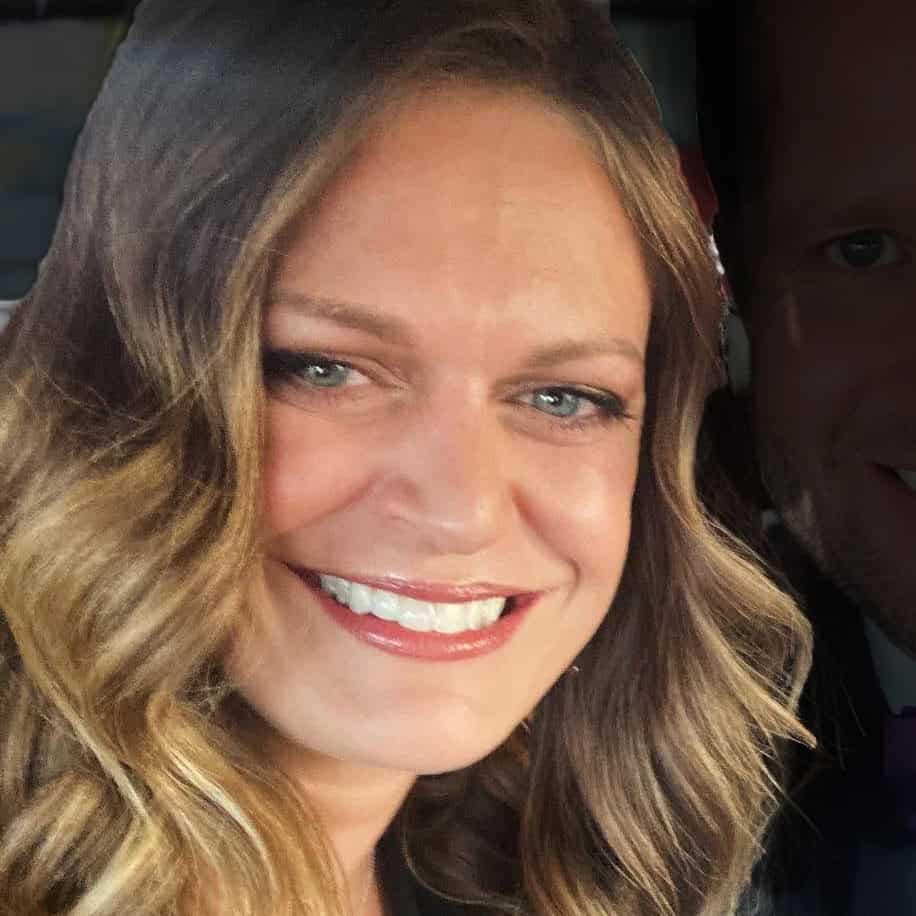
Mikelle Despain
Piano Insights Author
Mikelle is a classically trained pianist and former piano teacher who has been in the piano retail industry for over 20 years. Her dream piano is a Yamaha S5X. She currently provides expert insights for Piano Gallery to share information and advice for buying, playing, and enjoying the piano. When she's not writing or playing piano, she's spending time with her four kids, tending her vegetable garden, boondock camping, hiking, or cooking overly-extravagant meals for friends.
Further Reading...
2024 Guide: Best Grand Pianos For Your Family
© Piano Gallery 2024“When I had nothing else, I had my mother and the piano. And you know what? They were all I needed.” Alicia Keys Buying a grand piano for your family is no casual matter. People develop deep connections with musical instruments that often start at...
What is the Difference Between a Baby Grand Piano and Grand Piano?
Grand pianos and baby grand pianos are the epitome of a classic icon in music. With their elegant curves, propped lids, and exposed strings and soundboard, their beauty is often one of the first things people think of when considering a grand or baby grand piano. In...
2024 Best Beginner Pianos: A Complete Guide to Buying a Beginner Piano
© Piano Gallery of Utah 2024 If you’re looking to add a piano to your home for yourself or family members to learn to play on, then get ready for an exciting journey. Playing the piano is a lifelong passion for most players and brings music and joy to the home, as...
How Much Does a Baby Grand Piano Cost?
A baby grand piano is often chosen by musicians and enthusiasts not only for its elegant aesthetic, which enhances any room, but also for its rich, resonant sound quality that is superior to that of smaller pianos. Despite being more compact than a concert grand, a...
How Much Does a Piano Cost?
The cost of a piano varies widely based on its type, brand, condition (new or used), and the intricacies of craftsmanship involved in its manufacturing. In this article, our piano experts share price ranges for the main types of pianos, explain what impacts the...
Tips for Buying a Used Piano
2024 Used Piano Buying Guide Pianos are well-regarded as holding their value well, making used pianos a popular purchase, especially for new piano buyers or those looking to upgrade their pianos without a significant financial investment. Many pianos can hold their...
Complete Yamaha Disklavier Guide for 2024
In music, innovation often means striking a balance between preserving traditional craftsmanship and embracing modern technology. Yamaha, world renowned for its instruments, has mastered this balance with its Disklavier pianos, which combine a rich, resonant, classic...
Buying a Piano for Christmas? 12 Ideas for Surprising your Family with the Piano
A piano is one of the most memorable Christmas gifts your family can receive. Unlike some gifts, it's not played with for a few weeks then forgotten, it doesn't disappear into a closet until spring cleaning, it isn't quickly replaced by a new obsession or hobby, and...
10 Resolutions for Piano Players in 2024
For many of us, New Year's resolutions are heavy with responsibility, usually including health and exercise, work and finances, and even family relationships. One thing often overlooked in the resolution process is fun hobbies or passions such as playing the piano....
How a Grand Piano Works
If you're a piano player, can feel the magic of a grand piano as you play, your fingers moving across the keyboard with nuanced strokes that bring beautiful music that resounds through the instrument. Behind its elegant exterior lies a complex mechanism that...
A Guide to Buying a Piano as a Family Christmas Gift
The holiday season is a time of joy, togetherness, and creating lasting memories with our loved ones. If you're searching for a gift that will bring joy into your home, consider the timeless and elegant gift of a piano. How to Buy a Piano as a Gift Even though the...
Largest Collection of Quotes About Playing the Piano
When you're a pianist, playing the piano isn't just a hobby, it's a lifestyle. Even causal players feel a deep, meaningful connection to the instrument. In this article, we share some of our favorite quotes about playing the piano, because #IYKYK Favorite Piano Quotes...
